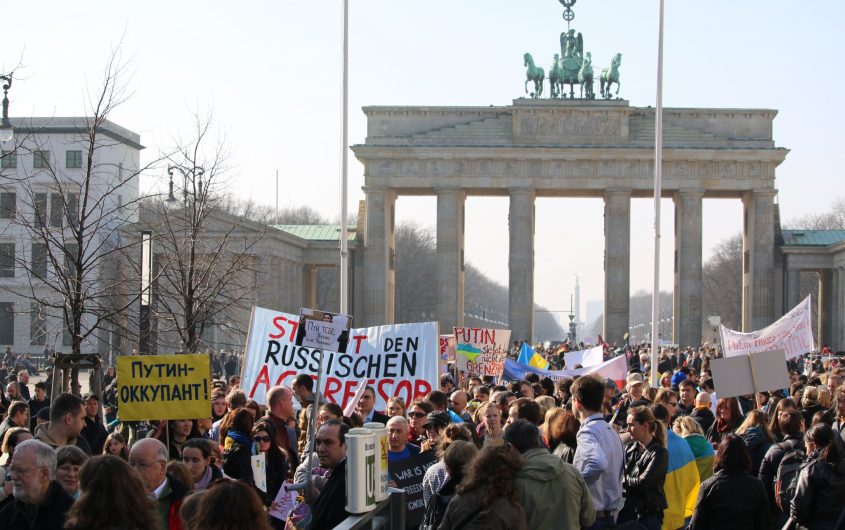
Mike Herbst via Flickr
Feet to the Fire

Hari Choudhari
Hari Krishan Choudhari is a research intern at AICGS for the fall of 2022. He supports resident fellows with their research projects, manages databases, and helps organize and document AICGS events. Mr. Choudhari is currently pursuing a Bachelor's Degree in International Politics at Georgetown University's Walsh School of Foreign Service, concentrating in Foreign Policy and Policy Processes and minoring in History and German. In his program, he concentrates on transatlantic security and U.S. foreign policy, and his interests include diplomacy, militarism, strategic culture, and South Asia studies.
Mr. Choudhari works concurrently as a Program Assistant and Undergraduate Scholar at the BMW Center for German and European Studies at Georgetown University. Additionally, he has conducted independent research on the Zeitenwende and Germany's changing strategic culture as part of the Laidlaw Scholars Program, which he hopes to continue.
Critique, Accountability, and Evolution in Germany’s Emerging Security Policy Debate
If, after his Zeitenwende speech on February 27, Chancellor Olaf Scholz believed he had done enough to cement his legacy as the arbiter of Germany’s new security policy, he would have been sorely mistaken. Criticism of his government’s sluggish progress towards arms provision to Ukraine has permeated recent German media and political discourse, with the loudest voices originating from his own party and coalition partners.
Anton Hofreiter, the influential chair of the Bundestag’s Committee on European Affairs, has emerged as one of the strongest critics from the Greens, to the point of Wirtschaftswoche’s Biederbeck-Keterrer noting that “the chancellor has an Anton Hofreiter Problem.” Hofreiter has not been shy to point his finger directly at the Chancellery, openly blaming the chancellor’s office for delays in heavy weapons supplies to Ukraine and criticizing Scholz’s fear of escalation. These statements began after Hofreiter visited Kyiv with leading legislators from coalition parties Marie-Agnes Strack-Zimmermann (FDP) and Michael Roth (SPD) in April, both of whom have also led the barrage of harsh rebukes leveled at the chancellor. Strack-Zimmermann, who serves as chair of the Bundestag Defense Committee, recently told the Atlantic’s Anne Appelbaum that, following the significant innovations of his Zeitenwende speech, it was as if Scholz “said these big words and then had to sit down and rest.” Roth, for his part, has pushed back against reluctant elements in his own party such as Rolf Mützenich, chairman of the SPD Parliamentary Group, while attempting to re-define the SPD’s approach to Ostpolitik and defense in an op-ed in Internationale Politik.
Amidst this whirling maelstrom of withering critique, it may appear on the surface that the Zeitenwende is in serious jeopardy of failing to fulfill its promises. In actuality, this robust debate is not a failure of the Zeitenwende, but is among its most enduring successes. The unprecedented liveliness of open debate on security policy is pioneering a new emphasis on strategic thinking and security policy in the mainstream discourse of Germany’s political elite. The manifestations of this shift are threefold.
1. Political About-Turns
While influential figures like Hofreiter, Strack-Zimmermann, and Roth may feature at the forefront of the security policy debate today, this could not have been further from the truth prior to Russia’s invasion of Ukraine. Hofreiter is part of a large contingent of Green party members such as Agniezska Brugger and Sara Nanni who, despite having mainly been critics of military force from a peace studies perspective, have recognized that the facts require a new approach to security issues. Green party veteran Daniel Cohn-Bendit, a leading figure among the Green supporters of the NATO intervention in Kosovo, perhaps put it best: “I am pained by the reality, not by having to face it”—and members of the Green party both old and young have turned to face a new reality rapidly and decisively.
Strack-Zimmermann and Roth, while not sharing the same pacifist roots as the Greens, nevertheless conformed largely to the pre-war orthodoxy of downplaying the use of military instruments to address international problems, including not sending arms to conflict zones. While Strack-Zimmermann has worked on defense issues for many years, Roth was most known for his work on EU-affairs, Franco-German cooperation, and the Western Balkans prior to the Russian invasion. Active participation in Germany’s security debate is hence resulting from a widespread recognition of the new European reality, even among those previously opposed or indifferent to discussions on military affairs.
2. Discourse and Accountability
Despite the fact that politicians do not necessarily practice what they preach, their words can serve as a source of accountability. The vocabulary of the Zeitenwende has permeated mainstream political discourse—a fact evident in the Bundestag debates surrounding the Sondervermögen, or the €100 billion special fund for the Bundeswehr. During the readings of the Sondervermögen bill, cabinet ministers including Finance Minister Lindner, Foreign Minister Baerbock, and Defense Minister Lambrecht, as well as opposition CDU/CSU spokespersons, emphasized bolstering defense capabilities, meeting alliance commitments, and “militarily defending” Germany’s values of freedom and democracy. This is, according to the draft bill, because “ensuring the external security of the Federal Republic of Germany is a core task of the state.”
As Germany attempts to craft a more robust strategic culture after decades of apathy and malaise, the growing pains that manifest as vigorous debate and criticism are promising signals for the future of European and transatlantic security.
Once key political figures endorsed these discursive innovations, it opened the floor for vocal figures to hold them to account for their own commitments. Hofreiter told the Atlantic that “heavy-weapons deliveries only happened because so many people ‘pushed and pushed’ for them.” Roth’s aforementioned op-ed argued in favor of “defending values” through a more robust European security architecture. Brugger, in calling for greater focus on civil defense and cybersecurity, stated that the opposing side “has not really understood Zeitenwende.” All of these examples show that the Zeitenwende and the discourse surrounding it has not only permeated general political debate on security, but has also become the benchmark for determining the successes or failures of government policy, thereby encouraging accountability.
3. Breaking Strategic-Cultural Malaise
Strategic culture, according to the Bundeswehr’s Institute of Social Sciences (SOWI), consists of “shared beliefs, norms and ideas within a given society that generate specific expectations about the respective community’s preferences and actions in security and defence policy.” Analysts and researchers of German security policy have long bemoaned the weakness of its strategic culture, characterized largely by political apathy towards security issues and a public aversion to military action or intervention.
The Zeitenwende has destroyed this ‘conspiracy of silence,’ demonstrated by the increasing intensity of security policy discussion in public discourse. Key political figures such as Defense Minister Lambrecht have noted that “this Zeitenwende (…) has also led to us finally talking much more seriously about military, defense, and security issues.” Media coverage of security issues supports this assertion, with the number of German-language articles pertaining to defense policy or military action in Germany in 2022 thus far already representing a 971 percent increase compared to 2021 (based on a search of the Factiva database). There has also been greatly increased usage of specific phrases such as “responsibility” (600 percent), “our security” (419 percent), “own security” (345 percent), and “Germany’s security” (306 percent). This represents a dramatic shift towards recognizing the immediacy of threat to Germany itself, abandoning prior consensus on Germany’s secure geopolitical situation within a friendly Europe.
German politics is therefore experiencing its own Zeitenwende in security discourse, wherein a new policy vocabulary and sense of accountability is shaping what may become an emergent orthodoxy in German strategic culture. Moreover, rather than representing a short-term focus on the Ukraine war, this emerging security discourse is laying greater emphasis on Germany’s own security and alliance responsibilities. As Germany attempts to craft a more robust strategic culture after decades of apathy and malaise, the growing pains that manifest as vigorous debate and criticism are promising signals for the future of European and transatlantic security.








